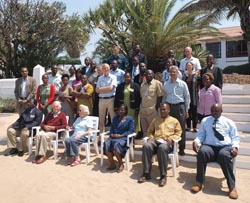|
The Farm Input Subsidy Program (FISP) in Malawi has been a tremendous success in improving maize yields and reducing hunger in the country. The FISP is however plagued by inefficiencies in the implementation and the use of inputs and as a result, donor countries have been hesitant to contribute to the funding of the program in recent years. AGRA organised a technical meeting with agricultural experts in Salima, Malawi, on August 27-28 to derive recommendations for the Malawian government to improve the FISP.
|
 |
There was wide consensus at the meeting that the baby - the FISP - should not be thrown away with the bathwater, but it is high time to make the bathwater more transparent. This has led to the advice to manage the FISP and especially the input procurement by a body independent from the government, and to limit the subsidy inputs to 70% of the free market price. To improve the input use efficiency in farmers’ fields, it was advised that blanket fertilizer recommendation should gradually be replaced by site-specific ones, to expand fertilizer blending capacity in the country, and to increase the role of grain legumes in the FISP. To achieve the latter, it was recommended to increase farmer access to improved legume seeds and to high-quality inoculants for soyabean, to promote fertiliser blends targeted to legumes, and to improve extension services around legumes. To make inoculants widely available to farmers, the government should ease import regulations and set-up a quality control system for inoculants.
The work implemented through N2Africa in Malawi has been key in providing a basis for recommending a central place for grain legumes in the FISP. The meeting provided a great opportunity to advise ministers and other policy makers in Malawi. Let’s hope Malawi’s government will follow the experts’ recommendations!
Linus Franke
